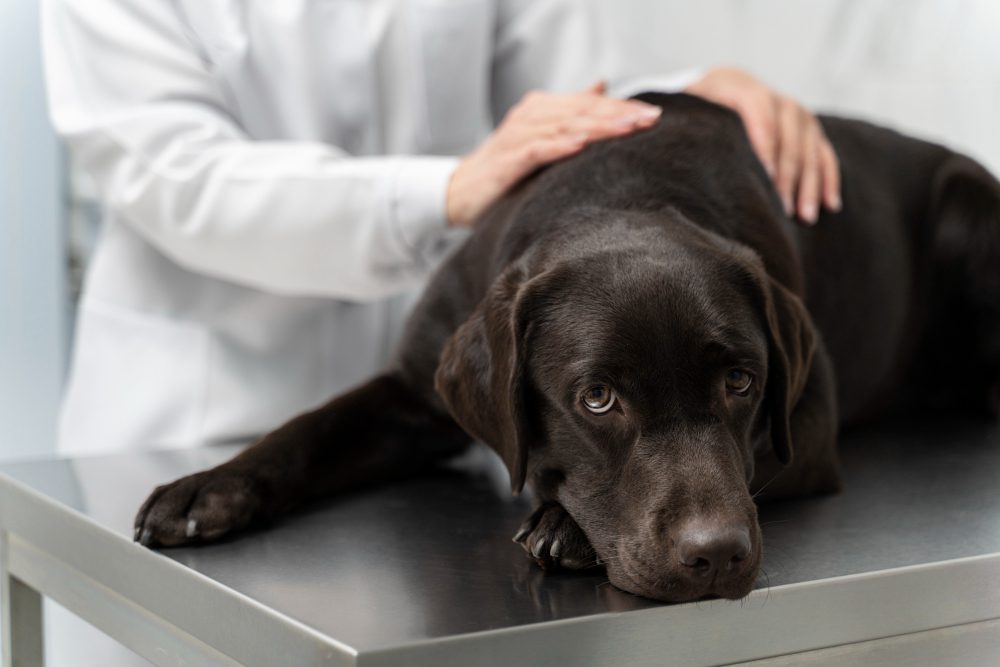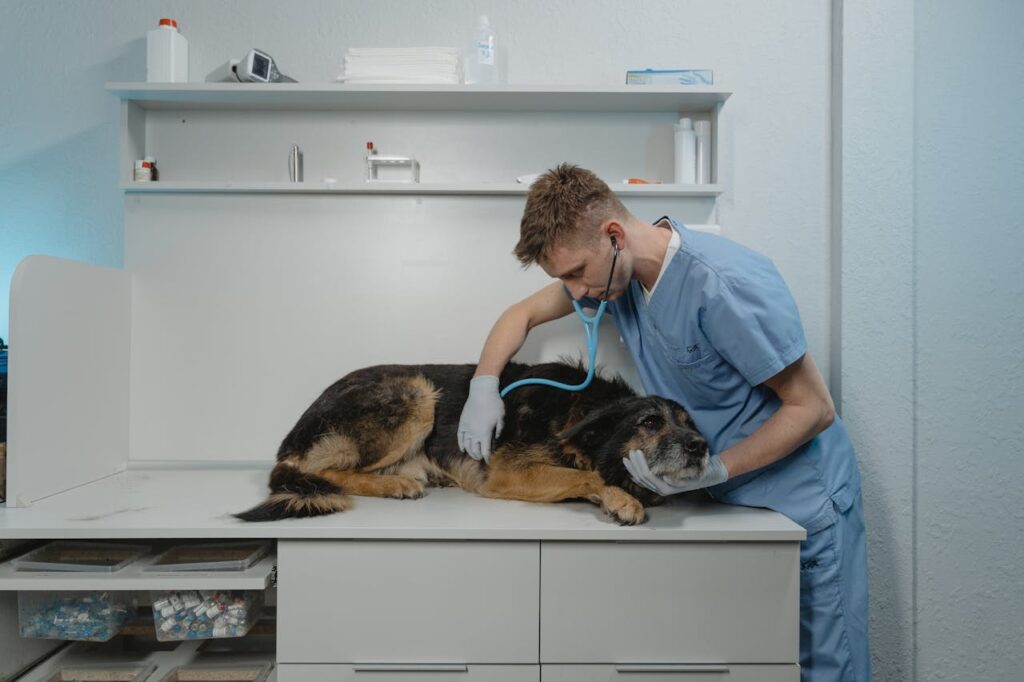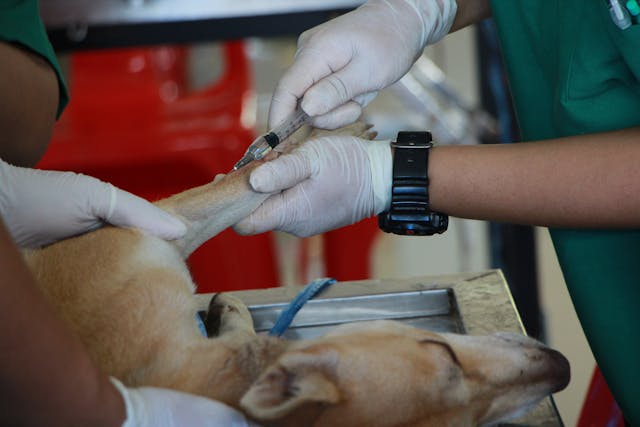Heartworm disease is a serious and potentially fatal condition that can affect dogs of any age or breed. As a responsible pet owner, it’s crucial to be aware of the wormearly signs of heartworms in your furry friend. In this comprehensive guide, we’ll delve into the first signs of heartworms in dogs, including symptoms, stages, and preventive measures.
Table of Contents
I. What Are Heartworms?
Heartworms are parasitic worms that primarily reside in the heart, lungs, and blood vessels of infected dogs. They are transmitted through the bite of an infected mosquito carrying heartworm larvae.
II. How Do Dogs Get Heartworms?
When a mosquito carrying heartworm larvae bites a dog, it deposits the larvae into the bloodstream. Over time, the larvae mature into adult worms, causing heartworm disease.
III. The First Signs of Heartworms in Dogs


Heartworms are a serious health concern for our beloved canine companions. These parasitic worms can wreak havoc on a dog’s heart and lungs if left untreated. Recognizing the early signs of heartworm infestation is crucial for prompt intervention and effective treatment. Let’s delve into the first signs that may indicate your dog has heartworms.
1. Coughing
One of the initial symptoms of heartworm disease in dogs is persistent coughing. This cough may start off as mild and sporadic but can gradually worsen over time. It often occurs due to the irritation caused by the presence of worms in the dog’s lungs and airways. If you notice your furry friend coughing frequently, especially after exercise or excitement, it’s essential to consult your veterinarian.
2. Exercise Intolerance
Heartworm-infected dogs may exhibit decreased tolerance for physical activity. You might observe your dog getting tired more quickly than usual during walks or playtime. This fatigue stems from the strain on the heart and lungs caused by the presence of heartworms. If your dog seems unusually lethargic or unwilling to engage in activities they once enjoyed, it could be a red flag for heartworm disease.
3. Reduced Appetite and Weight Loss
A decline in appetite and unexplained weight loss are common indicators of various health issues in dogs, including heartworm disease. The presence of heartworms can cause discomfort and nausea, leading to a decreased desire to eat. Additionally, the energy expended by the body in combating the infection can contribute to weight loss. Keep an eye on your dog’s eating habits, and consult your vet if you notice any significant changes.
4. Labored Breathing
As heartworms multiply and grow within a dog’s heart and lungs, they can obstruct blood flow and impede proper breathing. Labored breathing, characterized by rapid or shallow breaths, may become evident, especially after exertion or excitement. This symptom should never be ignored, as it indicates a severe progression of heartworm disease and warrants immediate veterinary attention.
5. Vomiting
In some cases, dogs with heartworms may vomit, particularly after physical exertion. Vomiting may occur due to the stress placed on the body by the presence of the parasites. Additionally, as heartworm disease progresses, it can lead to complications such as heart failure, which may manifest as gastrointestinal symptoms like vomiting. Any instances of vomiting, especially if accompanied by other concerning symptoms, should be promptly addressed by a veterinarian.
6. Lethargy and Weakness
Heartworm-infected dogs often experience general feelings of lethargy and weakness. The strain on the cardiovascular system caused by the presence of heartworms can leave dogs feeling fatigued and unenergetic. You might notice your dog sleeping more than usual or appearing less enthusiastic about activities. Pay attention to any changes in your dog’s energy levels, as they can provide valuable clues about their health status.
7. Abnormal Heart Sounds
During a veterinary examination, your vet may detect abnormal heart sounds in dogs with heartworm disease. These may include murmurs or irregular rhythms, indicating the presence of cardiac abnormalities caused by the worms. Regular check-ups with your veterinarian are essential for monitoring your dog’s heart health and detecting any abnormalities early on.
8. Distended Abdomen
As heartworm disease progresses, dogs may develop a distended or swollen abdomen. This symptom, known as ascites, occurs due to fluid accumulation in the abdominal cavity as a result of heart failure. A visibly distended abdomen should raise concerns and prompt an immediate visit to the vet for further evaluation and treatment.
9. Collapse
In severe cases of heartworm infestation, dogs may experience sudden collapse or fainting spells. This occurs when the heart is unable to pump an adequate amount of blood to meet the body’s needs, leading to a temporary loss of consciousness. Collapse is a critical emergency and requires immediate veterinary intervention to stabilize the dog’s condition.
10. Sudden Death
Tragically, untreated heartworm disease can ultimately lead to the death of an infected dog. As the worms multiply and obstruct blood flow to vital organs, irreversible damage can occur, resulting in sudden death. This devastating outcome underscores the importance of preventive measures and early detection through regular veterinary check-ups.
By familiarizing yourself with these early signs of heartworm disease in dogs, you can take proactive steps to protect your furry friend’s health and well-being. Remember, early detection and prompt intervention are key to successful treatment outcomes. If you suspect that your dog may have heartworms, don’t hesitate to seek veterinary care immediately.
IV. Recognizing Heartworm Symptoms in Puppies
Puppies are particularly vulnerable to heartworm infection. Look out for these signs in young dogs:
- Decreased Appetite: A sudden loss of interest in food or treats could indicate a health issue, including heartworms.
- Lack of Energy: Puppies infected with heartworms may appear listless or less playful than usual.
- Poor Growth: Heartworms can impair a puppy’s growth and development, leading to stunted growth or failure to thrive.
V. Heartworms and Vomiting: What to Watch For
Vomiting can be a symptom of various health issues in dogs, including heartworm disease. Pay attention to the following:
- Frequency: Persistent or recurrent vomiting, especially if accompanied by other symptoms, warrants a visit to the veterinarian.
- Blood in Vomit: If you notice blood in your dog’s vomit, seek immediate veterinary care as it could indicate a severe condition such as heartworm.
VI. Understanding the Stages of Heartworm Disease


Heartworm disease progresses through several distinct stages, each marked by specific physiological changes and clinical manifestations. By understanding these stages, pet owners can better comprehend the severity of the disease and the implications for their canine companions’ health. Let’s explore the progression of heartworm disease in dogs.
1. Stage 1: Transmission and Incubation
The first stage begins with the transmission of heartworm larvae (microfilariae) to a dog through the bite of an infected mosquito. Once inside the dog’s bloodstream, the larvae migrate to the heart and pulmonary arteries, where they undergo further development. During this incubation period, which typically lasts several months, there may be no visible symptoms of infection. However, the presence of larvae can be detected through specialized blood tests administered by a veterinarian.
2. Stage 2: Establishment of Infection
As the heartworm larvae mature into juvenile worms, they begin to cause damage to the heart and pulmonary vasculature. This stage is characterized by the onset of subtle symptoms such as occasional coughing, exercise intolerance, and mild lethargy. While these symptoms may be mild initially, they signify the establishment of heartworm infection and should not be overlooked. Veterinary intervention during this stage can prevent further progression of the disease and improve treatment outcomes.
3. Stage 3: Moderate Disease
In the third stage of heartworm disease, the worms continue to grow and multiply, leading to more pronounced clinical signs and complications. Dogs may experience persistent coughing, labored breathing, and reduced exercise tolerance. Additionally, abnormalities such as abnormal heart sounds and distended abdomen may become evident during physical examination. At this point, the disease has progressed significantly, requiring more intensive treatment and management strategies.
4. Stage 4: Advanced Disease
The fourth and final stage of heartworm disease is characterized by severe cardiopulmonary pathology and life-threatening complications. Dogs in this stage may exhibit profound lethargy, weakness, and collapse due to heart failure and respiratory distress. Abnormalities such as ascites (fluid accumulation in the abdomen) and cyanosis (bluish discoloration of mucous membranes) may also be present. Without prompt intervention, dogs in this stage face a grave prognosis, and treatment options may be limited.
5. Terminal Stage: End-Stage Heartworm Disease
In the terminal stage of heartworm disease, dogs experience irreversible damage to vital organs, leading to multi-organ failure and death. This stage is characterized by severe cardiopulmonary compromise, profound weakness, and a poor quality of life. Despite aggressive treatment efforts, the prognosis for dogs in this stage is guarded, emphasizing the importance of early detection and preventive measures.
VIII. Can Dogs Get Heartworms From Another Dog?
Heartworms cannot be directly transmitted from one dog to another. They require an intermediate host, typically a mosquito, to complete their life cycle.
IX. Preventive Measures for Heartworms


Preventing heartworm disease in dogs is far easier and less expensive than treating the condition once it develops. Fortunately, several effective preventive measures are available to safeguard our canine companions from this potentially life-threatening illness. Let’s explore the key strategies for preventing heartworm infection in dogs.
1. Monthly Preventive Medication
Administering monthly heartworm preventatives prescribed by your veterinarian is the cornerstone of heartworm disease prevention. These medications, available in various forms such as chewable tablets, topical treatments, and injectables, work by eliminating heartworm larvae before they mature into adult worms. It’s crucial to administer the preventive medication consistently and on schedule to ensure optimal protection for your dog.
2. Year-Round Protection
Heartworm disease can occur year-round in many regions, making year-round prevention essential. Even in colder climates where mosquito activity decreases during the winter months, it’s crucial to maintain continuous heartworm prevention to prevent lapses in protection. Consistency is key to effectively safeguarding your dog against heartworm infection.
3. Regular Veterinary Check-ups
Regular check-ups with your veterinarian are vital for monitoring your dog’s health and assessing their risk of heartworm infection. During these visits, your vet can perform heartworm tests to detect any signs of infection early on. Additionally, they can provide guidance on preventive measures tailored to your dog’s specific needs and lifestyle.
4. Minimize Exposure to Mosquitoes
Reducing your dog’s exposure to mosquitoes can help minimize the risk of heartworm transmission. Avoiding outdoor activities during peak mosquito activity times, such as dawn and dusk, can reduce the likelihood of mosquito bites. Additionally, using mosquito repellents approved for use on dogs and ensuring screens on windows and doors are intact can further reduce exposure.
5. Environmental Control
Implementing environmental control measures can help reduce mosquito breeding grounds around your home. Regularly removing standing water sources, such as stagnant ponds, bird baths, and clogged gutters, can deprive mosquitoes of breeding sites. Additionally, using mosquito larvicides in areas prone to mosquito infestation can further limit mosquito populations.
6. Heartworm Testing
Regular heartworm testing is essential, even for dogs on preventive medication, to ensure that they remain free of infection. Annual heartworm tests are typically recommended, although your veterinarian may advise more frequent testing based on your dog’s risk factors and regional prevalence of heartworm disease. Early detection allows for prompt intervention and treatment if necessary.
7. Educating Pet Owners
Educating pet owners about the importance of heartworm prevention and the risks associated with the disease is crucial for promoting compliance with preventive measures. Providing information on the prevalence of heartworm disease in their area, the significance of regular veterinary care, and the benefits of preventive medications can empower pet owners to take proactive steps in protecting their furry companions.
X. Treatment Options for Heartworm Disease
Heartworm disease poses a significant threat to the health and well-being of dogs, but fortunately, several treatment options are available to combat this parasitic infection. The choice of treatment depends on various factors, including the stage of the disease, the overall health of the dog, and the presence of any complications. Let’s explore the treatment options for heartworm disease in dogs.


1. Immiticide Therapy
Immiticide therapy is the most common and effective treatment for heartworm disease in dogs. Immiticide, also known as melarsomine dihydrochloride, is an arsenic-based medication administered by deep intramuscular injection. It works by killing adult heartworms residing in the heart and pulmonary arteries. Immiticide treatment typically involves a series of injections given over a specified period, under the supervision of a veterinarian.
2. Antibiotic Therapy
Antibiotics may be prescribed as part of the treatment protocol for heartworm disease, particularly to prevent secondary bacterial infections. As heartworms die off and break down within the dog’s body, they can trigger an inflammatory response that may predispose the dog to bacterial infections. Antibiotics help mitigate this risk and promote healing during the post-treatment recovery period.
3. Steroid Therapy
Steroids, such as prednisone, may be prescribed to manage inflammation and alleviate symptoms associated with heartworm disease. Steroids help reduce swelling in the heart and lungs, improving respiratory function and alleviating discomfort. However, steroid therapy is typically used in conjunction with other treatments and is tailored to the individual needs of the dog.
4. Exercise Restriction
During treatment for heartworm disease, dogs must undergo strict exercise restrictions to minimize the risk of complications. Vigorous physical activity can exacerbate cardiovascular strain and increase the likelihood of complications such as embolism or thrombosis. Pet owners must follow their veterinarian’s recommendations regarding exercise restriction to ensure the success of treatment and promote optimal healing.
5. Nutritional Support
Proper nutrition is essential for supporting the immune system and promoting recovery in dogs undergoing treatment for heartworm disease. A balanced diet rich in essential nutrients, vitamins, and antioxidants can help strengthen the dog’s immune response and facilitate tissue repair. Additionally, dietary supplements such as omega-3 fatty acids may offer anti-inflammatory benefits and support cardiovascular health.
6. Follow-Up Care and Monitoring
After completing treatment for heartworm disease, dogs require regular follow-up care and monitoring to assess treatment efficacy and detect any potential complications. Follow-up appointments with the veterinarian may include repeating heartworm testing, chest radiographs, and echocardiograms to evaluate the dog’s cardiac and respiratory function. Close monitoring ensures that any emerging issues are promptly addressed, maximizing the chances of a successful outcome.
Conclusion
Being vigilant about the early signs of heartworms in dogs is crucial for protecting your furry friend’s health and well-being. By staying informed, proactive, and seeking regular veterinary care, you can help safeguard your dog against this potentially devastating disease. Remember, prevention is always better than cure when it comes to heartworms.
Frequently Asked Questions (FAQs)
Q1: Can heartworms be cured in dogs? A1: Yes, heartworm disease can be treated in dogs with appropriate veterinary care and medication. However, prevention is always preferable to treatment.
Q2: How long does it take for heartworms to develop in dogs? A2: It typically takes several months for heartworm larvae to mature into adult worms and cause clinical signs in dogs.
Q3: Is heartworm disease contagious to other pets or humans? A3: No, heartworm disease is not contagious between animals or humans. It requires the presence of mosquitoes as intermediate hosts for transmission.
Q4: Can indoor dogs get heartworms? A4: Yes, even indoor dogs are at risk of heartworm infection if they are bitten by mosquitoes carrying heartworm larvae.
Q5: Are heartworm preventives safe for all dogs? A5: Most heartworm preventives are safe for dogs of all breeds and sizes. However, it’s essential to consult with your veterinarian to determine the most suitable preventive for your dog’s individual needs.




Simply wish to say your article is as amazing The clearness in your post is just nice and i could assume youre an expert on this subject Well with your permission let me to grab your feed to keep updated with forthcoming post Thanks a million and please carry on the gratifying work.